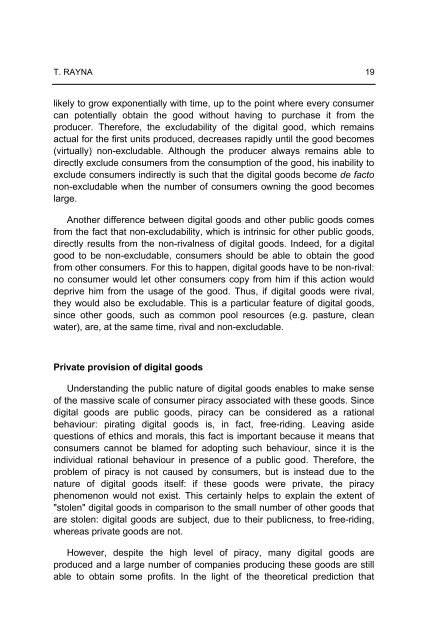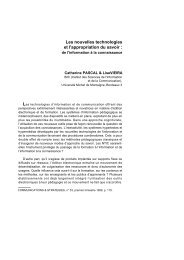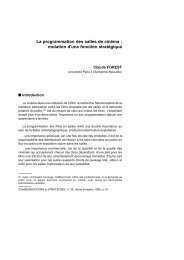The Nature of Digital Goods - Idate
The Nature of Digital Goods - Idate
The Nature of Digital Goods - Idate
You also want an ePaper? Increase the reach of your titles
YUMPU automatically turns print PDFs into web optimized ePapers that Google loves.
T. RAYNA 19<br />
likely to grow exponentially with time, up to the point where every consumer<br />
can potentially obtain the good without having to purchase it from the<br />
producer. <strong>The</strong>refore, the excludability <strong>of</strong> the digital good, which remains<br />
actual for the first units produced, decreases rapidly until the good becomes<br />
(virtually) non-excludable. Although the producer always remains able to<br />
directly exclude consumers from the consumption <strong>of</strong> the good, his inability to<br />
exclude consumers indirectly is such that the digital goods become de facto<br />
non-excludable when the number <strong>of</strong> consumers owning the good becomes<br />
large.<br />
Another difference between digital goods and other public goods comes<br />
from the fact that non-excludability, which is intrinsic for other public goods,<br />
directly results from the non-rivalness <strong>of</strong> digital goods. Indeed, for a digital<br />
good to be non-excludable, consumers should be able to obtain the good<br />
from other consumers. For this to happen, digital goods have to be non-rival:<br />
no consumer would let other consumers copy from him if this action would<br />
deprive him from the usage <strong>of</strong> the good. Thus, if digital goods were rival,<br />
they would also be excludable. This is a particular feature <strong>of</strong> digital goods,<br />
since other goods, such as common pool resources (e.g. pasture, clean<br />
water), are, at the same time, rival and non-excludable.<br />
Private provision <strong>of</strong> digital goods<br />
Understanding the public nature <strong>of</strong> digital goods enables to make sense<br />
<strong>of</strong> the massive scale <strong>of</strong> consumer piracy associated with these goods. Since<br />
digital goods are public goods, piracy can be considered as a rational<br />
behaviour: pirating digital goods is, in fact, free-riding. Leaving aside<br />
questions <strong>of</strong> ethics and morals, this fact is important because it means that<br />
consumers cannot be blamed for adopting such behaviour, since it is the<br />
individual rational behaviour in presence <strong>of</strong> a public good. <strong>The</strong>refore, the<br />
problem <strong>of</strong> piracy is not caused by consumers, but is instead due to the<br />
nature <strong>of</strong> digital goods itself: if these goods were private, the piracy<br />
phenomenon would not exist. This certainly helps to explain the extent <strong>of</strong><br />
"stolen" digital goods in comparison to the small number <strong>of</strong> other goods that<br />
are stolen: digital goods are subject, due to their publicness, to free-riding,<br />
whereas private goods are not.<br />
However, despite the high level <strong>of</strong> piracy, many digital goods are<br />
produced and a large number <strong>of</strong> companies producing these goods are still<br />
able to obtain some pr<strong>of</strong>its. In the light <strong>of</strong> the theoretical prediction that





